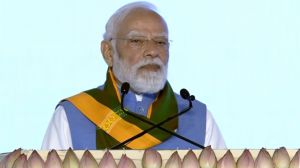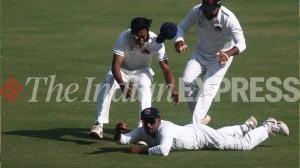Judge without scarf has Afghans splitting hairs
When Marzia Basel, one of Afghanistan’s few female judges, went to the US, she met with President Bush, Secretary of State Colin Powell...

When Marzia Basel, one of Afghanistan’s few female judges, went to the US, she met with President Bush, Secretary of State Colin Powell and other dignitaries to appeal for more assistance for her homeland. Returning home, she was greeted by derogatory headlines and sneers because, while in the US, she hadn’t worn her chador, the scarf used by many Muslim women to cover their hair.
The controversy began when Kabul’s television station broadcast footage of her and 13 other Afghan women in a vaunted US State Department international leadership-training program. The private weekly Thubat, or Proof, criticised their behaviour. ‘‘These women had gone as modest women but dishonoured the people of Afghanistan,’’ the paper wrote. ‘‘The officials made a big mistake sending them to the US.’’
Several publications reported that the Afghan government had fired Basel, one of 32 female judges among several hundred jurists. A senior court official dismissed that suggestion, and Basel herself says she quit the judgeship, which pays $54 a month, to join UNICEF, where she is building a juvenile-justice program.
She said she’s angry, hurt and depressed about the criticism and fears for her safety. ‘‘I did a lot for my country there,’’ she said. ‘‘Today I want to cry, hearing these things.’’ Basel blames the media, not the government, for creating the furore. ‘‘Afghan media don’t want to learn and be educated. If women are strong and educated, it will be a problem for them.’’ As for the chador, she says, ‘‘We are Muslims. It’s good if we wear it, but if we don’t, it’s all right. Lots of Muslim women don’t wear it.’’
The chador issue has been a lightning rod for controversy centering on the role of women in Afghan society. Unlike under the Taliban, which forbade women from appearing outside without their burqas, today there are no legal restrictions on what women can wear. Still, social and religious dictates hold powerful sway. The majority of Afghan women still wear their burqas on the street, fearing harassment from men if they do not.
In recent weeks, however, many have been pulling them back to expose their faces or taking them off altogether. Those who don’t wear burqas usually wear a chador, which most keep on inside the workplace. Television announcers have been ordered to wear them during broadcasts.
Deputy Chief Justice of the Supreme Court Fazal Ahmad Manawi says that, legally, women should have a choice about what to wear. ‘‘But personally,’’ he adds, ‘‘we advise our people to observe our culture wherever they are.’’ Safia Siddiqi, 38, president of planning and international relations at the Ministry of Women’s Affairs, never wore a chador when she lived in Canada, where she spent several years as a refugee before returning to Afghanistan recently.
During a recent interview at her office, she wore a skirt and blazer with a chador around her head. ‘‘So many issues are more important than whether women wear a chador,’’ she said, citing security and health. ‘‘We’ve just gone through 23 years of problems, especially the last six years under the Taliban,’’ she says. ‘‘It’s our idea that it’s not difficult to put a piece of cloth on your head. It’s respectful and at least we should wear it. If we remove it, it means the future is a problem’’ for this society. Basel, too, wears the chador in Kabul.
The Quran, she said, exhorts women to cover ‘‘their beautiful parts, such as their breasts, hips and legs, but doesn’t say they should hide their faces or cover themselves with burkas.’’ ‘‘Real Islam is not the Islam (they) are expressing,’’ she said of her critics. ‘‘It is such a great religion that gave women rights and equality. But people are illiterate and they don’t know what real Islam is. ‘‘We have enough people remaining who are Taliban but have just changed their faces.’’ — LATWP


- 01
- 02
- 03
- 04
- 05





























